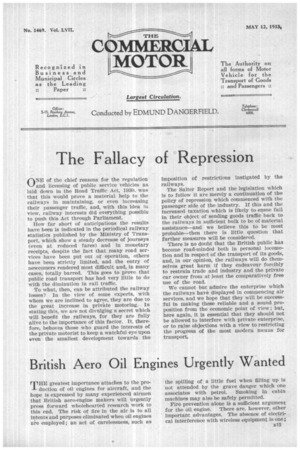The Fallacy of Repression
Page 31

If you've noticed an error in this article please click here to report it so we can fix it.
ONE of the chief reasons for the regulation and licensing of public service vehicles as laid down in the Road Traffic Act, 1930. was that this would prove a material help to the railways in maintaining, or even increasing their passenger traffic, and, with this idea in view, railway interests did everything possible to push this Act through Parliament.
How far short of anticipations the results have been is indicated in the periodical railway statistics published by the Ministry of Transport, which show a steady decrease of journeys (even at reduced fares) and in monetary receipts, despite the fact that many road services have been put out or operation, others have been strictly limited, and the entry of newcomers rendered most difficult and, in many cases, totally barred. This goes to prove that public road transport has had very little to do with the diminution in rail traffic.
To what, then, can be attributed the railway losses? In the view of some experts, with whom we are inclined to agree, they are due to the great increase in priviite motoring. In stating this, we are not divulging a secret which will benefit the railways, for they are fully alive to the importance of this factor. It, therefore, behaves those who guard the interests of the private motorist to keep a watchful eye upon even the smallest development towards the Imposition of restrictions instigated by the railways.
The Salter Report and the legislation which is to follow it are merely a continuation of the policy of repression which commenced with the passenger side of the industry. If this and the increased taxation which is likely to ensue fail in their object of sending goods traffic back to the railways in sufficient bulk to be of material assistance—and we believe this to be most probable—then there is little question that further measures will be considered.
There is no doubt that the British public has become road-minded both in personal locomotion and in respect of the transport of its goods, and, in our opinion, the railways will do themselves great harm if they endeavour forcibly to restrain trade and industry and the private car owner from at least the comparatively free use of the road.
We cannot but admire the enterprise which the railways have displayed in commencing air services, and we hope that they will be successful in making these reliable and a sound proposition from the economic point of view ; but, here again, it is essential that they should not be allowed to interfere with private enterprise, or to raise objections with a view to restricting the progress of the most modern means for transport.




































































































